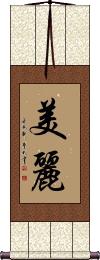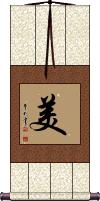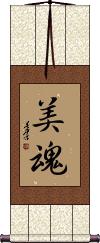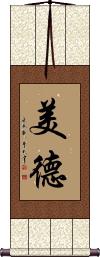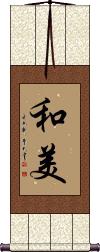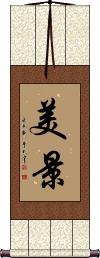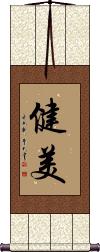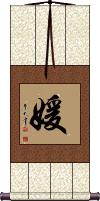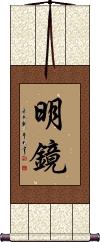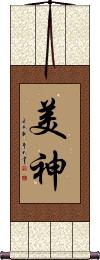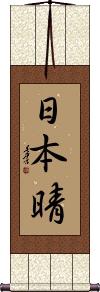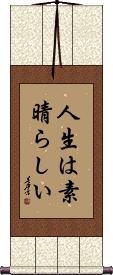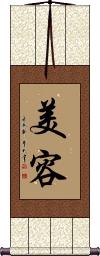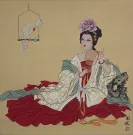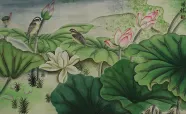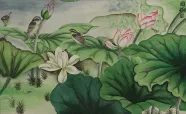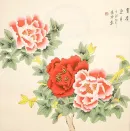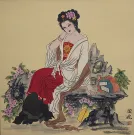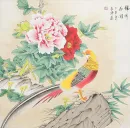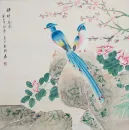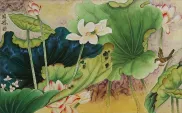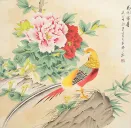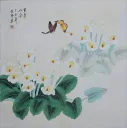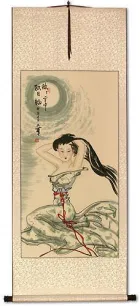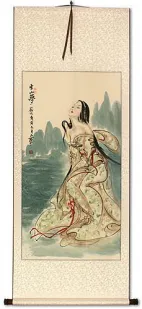Many custom options...
And formats...

Beautiful in Chinese / Japanese...
Buy a Beautiful calligraphy wall scroll here!
Personalize your custom “Beautiful” project by clicking the button next to your favorite “Beautiful” title below...
1. Beautiful
2. Beautiful Heart / Beautiful Spirit
3. Beauty / Beautiful / Handsome
6. Beautiful Life / Life in Perfect Harmony
7. Beautiful Heart / Beautiful Mind
10. Beautiful Sight
14. Beautiful Soul
15. Beautiful Spirit
16. Beautiful Mind
18. Beauty / Beautiful Princess
20. Goddess of Beauty / Beautiful Spirit
22. Life is Good / Life is Beautiful
23. The Good Life / Beautiful Life
Beautiful
美麗 is a two-character word used often in Chinese, old Korean, and ancient Japanese to express beauty.
I've had a few requests for a “two-character beautiful,” and this is by far the best word. This is not a common word for an Asian person to want on a wall scroll. However, you will see it commonly used as an adjective in phrases, stories, and titles throughout magazines and signage in China.
美麗 can also be translated as gorgeous or lovely.
Note: 美麗 is not commonly used in modern Japan.
Beautiful Heart / Beautiful Spirit
Beauty / Beautiful / Handsome
美 is often used to describe the beauty of a woman.
However, when applied to a man, it can mean handsome. It's also the first character in the word for “beauty salon” which you will see all over China and Japan.
This can be used as the given name for a girl (spell it or say it as “Mei” or “May”).
For a bit of trivia: The title for the “USA” in Chinese is “Mei Guo” which literally means “Beautiful Country.” This name was bestowed at a time before Chairman Mao came to power and decided that China didn't like the USA anymore (even though we fought together against the Japanese in WWII). But these days, Chinese people love Americans (but have a distaste for American politics and policy). But I digress...
美 is also how “Beautiful” is written in Japanese Kanji and Korean Hanja. 美 can also mean: very satisfactory; good; to be pleased with oneself; abbreviation for the USA; fine; handsome; admirable; madhura; sweet; and/or pleasant.
Beautiful Soul
Beautiful Soul
Beautiful Virtue
美德 written in Chinese or Korean Hanja can also mean “grace of character” or “noble virtue.”
![]() There is a slight variation in the modern Japanese Kanji form of the second character. If you want the modern Japanese version, please click on the special Kanji shown to the right instead of the button above. Note that the traditional Chinese form is still readable and understood by Japanese people (
it’s
the ancient Japanese form anyway).
There is a slight variation in the modern Japanese Kanji form of the second character. If you want the modern Japanese version, please click on the special Kanji shown to the right instead of the button above. Note that the traditional Chinese form is still readable and understood by Japanese people (
it’s
the ancient Japanese form anyway).
Beautiful Life / Life in Perfect Harmony
和美 is a word that means “harmonious” or, “in perfect harmony.”
The deeper meaning or more natural translation would be something like, “beautiful life.”
The first character means peace and harmony.
The second character means beautiful. But in this case, when combined with the first character, beautiful refers to being satisfied with what you have in your life. This can be having good relations, good feelings, comfort, and having enough (with no feeling of wanting).
Note: In Japanese, this is often used as the name "Wami." This title is probably more appropriate if your audience is Chinese.
Beautiful Heart / Beautiful Mind
Beautiful Girl
Beautiful Woman
美麗的女人 is the best and most polite way to express “beautiful woman” in Chinese.
Note: Some people may like the simple 2-character 美女 way to express this, but there are some bad connotations with that, so better to stay with this longer and more respectful title.
See Also: Beauty
Beautiful Sight
美景 can be translated as a beautiful view, beautiful scenery, or a beautiful sight.
Note: Not a commonly used word in modern Japanese.
Beautiful Dreamer
Beautiful Princess
美麗的公主 is how to write beautiful princess in Chinese.
The first two characters mean feminine beauty or rather a way to say beautiful that only applies to women. The middle character is just a connecting character. The last two characters mean princess.
See Also: Queen
Strong and Beautiful
We don't really have a word like 健美 in English, but these two characters create a word that means “strong and beautiful.” It could also be translated as “healthy and beautiful.”
Note: 健美 is a word in Chinese and Korean, but it's also the family name Takemi in Japanese. The characters hold the same meaning in Japanese; however, it's like having the English name Stillwell when few people would perceive the meanings of still and well.
Beautiful Soul
Beautiful Spirit
Beautiful Mind
Beautiful Woman Proverb
沈魚落雁 is an old proverb that literally means “fish sink, goose alights.”
...But this takes some explaining. This is a proverb from Zhuangzi (莊子), who lived in the late 4th century BC.
This figuratively refers to female beauty that is so captivating that even the birds and beasts take notice.
Perhaps a better and more accurate way to describe this is to say that it speaks of the charms of a uniquely beautiful woman who is so beautiful that fish stay on the bottom of the water and flying wild geese fall from the sky in shame.
This proverb is so famous that it is also known and used in Japan (same characters, different pronunciation).
Note: This can also be written 沉魚落雁 instead of 沈魚落雁 (just the first character varies slightly).
Beauty / Beautiful Princess
媛 means, a beauty; beautiful (woman); princess; a young lady of noble birth; girl; small & lovely.
媛 is used a bit more commonly in Chinese than in Japanese.
Note: This can be the female given name "Hime" in Japanese.
Mirror: Beautiful Clarity
While 明鏡 means mirror in Chinese, Japanese Kanji, and old Korean Hanja, it's commonly used as a metaphor for something beautiful and bright or something that provides clarity and insight.
Goddess of Beauty / Beautiful Spirit
In Chinese, 美神 means Goddess of Beauty.
The first character means beauty or beautiful.
The second character means spirit (can also mean god, goddess, or soul).
Some will use this as a short way to say, “Beautiful Spirit.”
This has a similar meaning in Japanese but is used more often as a female given name in Japan. As a Japanese given name, it can be pronounced Mikami, Mikan, or Binasu.
Beautiful Clear Sky
日本晴 is a Japanese Kanji title that means beautiful weather, clear and cloudless sky, or clear weather.
It's a little odd, but if you literally translated this phrase, it says, “Japanese weather,” as if that was an indication of perfect weather (maybe a little arrogant on behalf of Japan - I've experienced a monsoon there, which was unpleasant).
Life is Good / Life is Beautiful
人生は素晴らしい means “life is good,” “life is great,” or “life is beautiful” in Japanese.
The first two characters mean “life” (as in your or a human lifespan).
The third character kind of means “is.”
The last five characters are a long adjective that means wonderful, splendid, and/or magnificent. In the context of life, it reads more like good or beautiful.
Note: Because this selection contains some special Japanese Hiragana characters, it should be written by a Japanese calligrapher.
The Good Life / Beautiful Life
Life is Good / Life is Beautiful
Beauty: The art of makeup / cosmetics
In Chinese, 美容 is the title for the art of beauty, as applying makeup or cosmetics to enhance beauty.
Note: In Japanese and Korean, this takes the meaning of beautiful face or beauty of figure or form. Be sure you know who your audience is and have matched the desired meaning.
This in-stock artwork might be what you are looking for, and ships right away...
Gallery Price: $268.00
Your Price: $148.88
Gallery Price: $268.00
Your Price: $148.88
Gallery Price: $353.00
Your Price: $195.88
Gallery Price: $268.00
Your Price: $148.88
Gallery Price: $232.00
Your Price: $128.88
Gallery Price: $200.00
Your Price: $88.88
These search terms might be related to Beautiful:
1000 Good Moves Ruined by 1 Bad
A House Might Be Worth 1 Million Dollars, but Good Neighbors Are Worth 10 Million
Adonis / Handsome Young Man
Adorable / Cute / Lovely
Beauty / Beautiful / Handsome
Blessings and Good Wishes
Clever / Superb / Wonderful
Distinguish Good and Evil
Doing Good is the Greatest Source of Happiness
Elegant / Exquisite / Grace
Even a Fool May Sometimes Come Up With a Good Idea
Every Day is a Good Day
Extremely Good Friends
Fragrant / Good Smell
God is Good
Good and Evil
Good Conduct
Good Good Study, Day Day Up
Good Health
Good Health / Healthy / Vigor
Good Heart
Good Intentions
Good Intentions / Good Will / Good Faith
Good Luck
Good Luck / Good Fortune
Good Night
Goodness / Good Deed
Hearing a Hundred Times is Not as Good as Seeing Once
House of Good Fortune
In Good Order
In Good Order / Organized
Life is Good
Life is Good / Life is Beautiful
Looking Forward / Hoping
Lucky / Auspicious / Good Omen
One Good Deed Each Day
Opportunity / Good Luck
Peace and Good Health
Restoration to Good Health
The Foundation of Good Conduct
The Good Life / Beautiful Life
Work Unselfishly for the Common Good
The following table may be helpful for those studying Chinese or Japanese...
| Title | Characters | Romaji (Romanized Japanese) | Various forms of Romanized Chinese | |
| Beautiful | 美麗 美丽 | birei | měi lí / mei3 li2 / mei li / meili | |
| Beautiful Heart Beautiful Spirit | 美麗的心靈 美丽的心灵 | měi lì de xīn líng mei3 li4 de xin1 ling2 mei li de xin ling meilidexinling | mei li te hsin ling meilitehsinling |
|
| Beauty Beautiful Handsome | 美 | bi | měi / mei3 / mei | |
| Beautiful Soul | 美麗的靈魂 美丽的灵魂 | měi lì de líng hún mei3 li4 de ling2 hun2 mei li de ling hun meilidelinghun | mei li te ling hun meilitelinghun |
|
| Beautiful Soul | 美魂 | bi tamashi / bitamashi | ||
| Beautiful Virtue | 美德 美德 / 美徳 | bitoku | měi dé / mei3 de2 / mei de / meide | mei te / meite |
| Beautiful Life Life in Perfect Harmony | 和美 | wa mi / wami | hé měi / he2 mei3 / he mei / hemei | ho mei / homei |
| Beautiful Heart Beautiful Mind | 美しい心 | utsukushii kokoro utsukushiikokoro utsukushi kokoro | ||
| Beautiful Girl | 美麗的姑娘 美丽的姑娘 | měi lì de gū niang mei3 li4 de gu1 niang mei li de gu niang meilideguniang | mei li te ku niang meilitekuniang |
|
| Beautiful Woman | 美麗的女人 美丽的女人 | měi lì de nǚ rén mei3 li4 de nv3 ren2 mei li de nv ren meilidenvren | mei li te nü jen meilitenüjen |
|
| Beautiful Sight | 美景 | bi kei / bikei | měi jǐng / mei3 jing3 / mei jing / meijing | mei ching / meiching |
| Beautiful Dreamer | 美麗的夢神 美丽的梦神 | měi lì de mèng shén mei3 li4 de meng4 shen2 mei li de meng shen meilidemengshen | mei li te meng shen meilitemengshen |
|
| Beautiful Princess | 美麗的公主 美丽的公主 | měi lì de gōng zhǔ mei3 li4 de gong1 zhu3 mei li de gong zhu meilidegongzhu | mei li te kung chu meilitekungchu |
|
| Strong and Beautiful | 健美 | takemi | jiàn měi / jian4 mei3 / jian mei / jianmei | chien mei / chienmei |
| Beautiful Soul | 美しい魂 | utsukushii tamashii utsukushiitamashii utsukushi tamashi | ||
| Beautiful Spirit | 美しい精神 | utsukushi seishin utsukushiseishin | ||
| Beautiful Mind | 美麗心靈 美丽心灵 | měi lì xīn líng mei3 li4 xin1 ling2 mei li xin ling meilixinling | mei li hsin ling meilihsinling |
|
| Beautiful Woman Proverb | 沈魚落雁 沈鱼落雁 | chin gyo raku gan chingyorakugan | chén yú luò yàn chen2 yu2 luo4 yan4 chen yu luo yan chenyuluoyan | ch`en yü lo yen chenyüloyen chen yü lo yen |
| Beauty Beautiful Princess | 媛 | hime / haru | yuàn / yuan4 / yuan | yüan |
| Mirror: Beautiful Clarity | 明鏡 明镜 | mei kyou / meikyou / mei kyo | míng jìng ming2 jing4 ming jing mingjing | ming ching mingching |
| Goddess of Beauty Beautiful Spirit | 美神 | mikami | měi shén / mei3 shen2 / mei shen / meishen | |
| Beautiful Clear Sky | 日本晴 | nihonbare | ||
| Life is Good Life is Beautiful | 人生は素晴らしい | jinsei wa subarashii jinseiwasubarashii jinsei wa subarashi | ||
| The Good Life Beautiful Life | 美好的生活 | měi hǎo de shēng huó mei3 hao3 de sheng1 huo2 mei hao de sheng huo meihaodeshenghuo | mei hao te sheng huo meihaoteshenghuo |
|
| Life is Good Life is Beautiful | 生活美好 | shēng huó měi hǎo sheng1 huo2 mei3 hao3 sheng huo mei hao shenghuomeihao | ||
| Beauty: The art of makeup cosmetics | 美容 | biyou / biyo | měi róng / mei3 rong2 / mei rong / meirong | mei jung / meijung |
| In some entries above you will see that characters have different versions above and below a line. In these cases, the characters above the line are Traditional Chinese, while the ones below are Simplified Chinese. | ||||
Successful Chinese Character and Japanese Kanji calligraphy searches within the last few hours...
